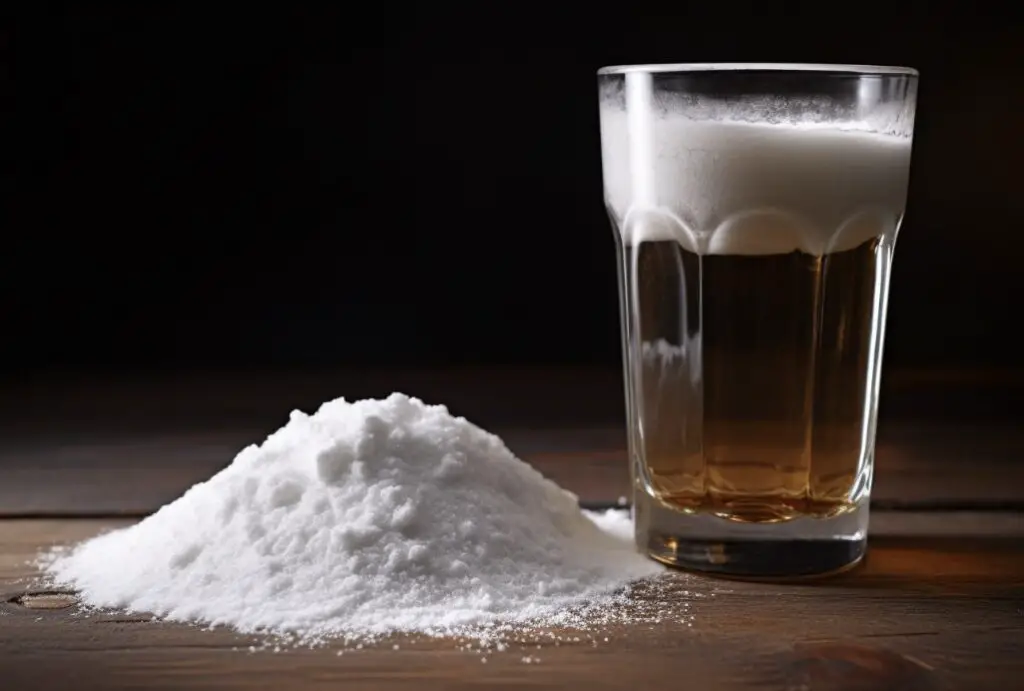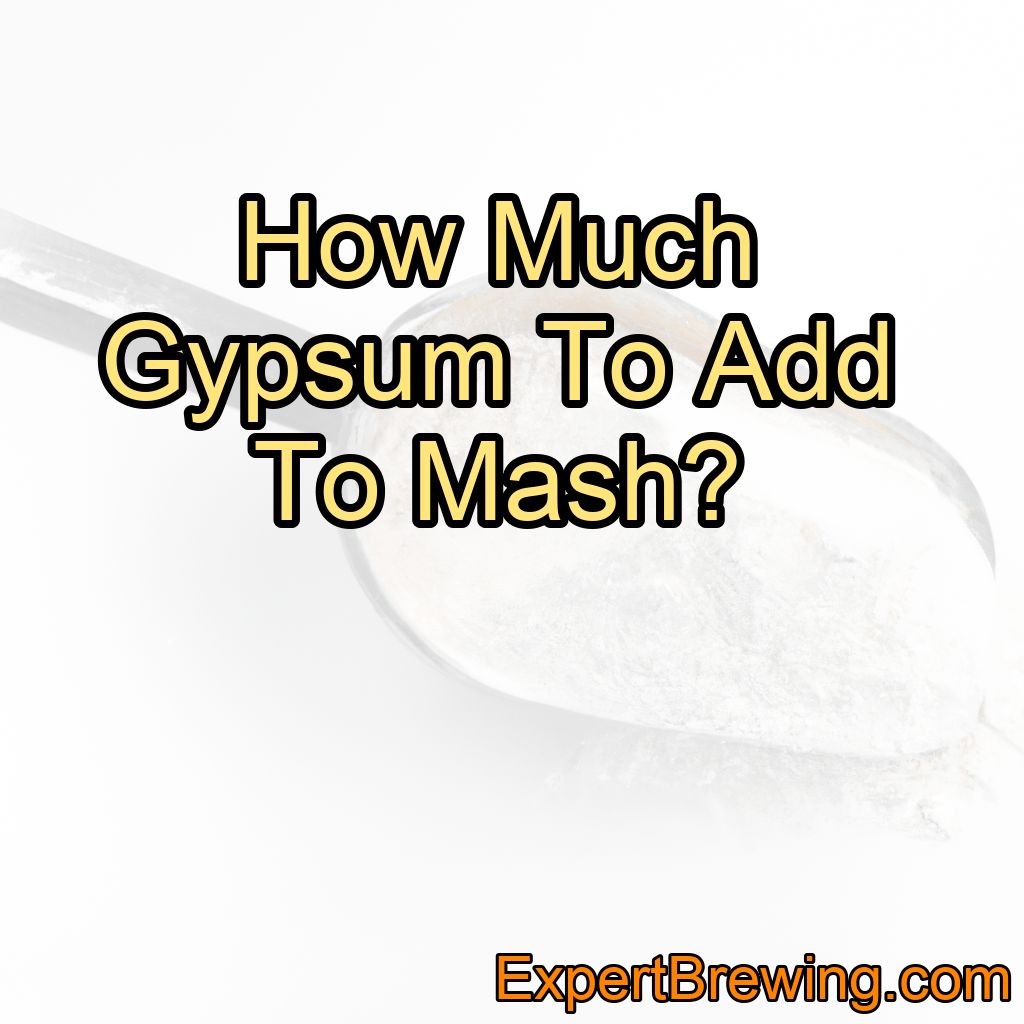As a seasoned home brewer, one of the questions I frequently get asked how much gypsum to add to mash when brewing beer?
The answer to that isn’t as straightforward as you might think. It depends on several factors, including the type of beer you’re brewing, the water you’re using, and your desired flavor profile.
But to put it simply, a general guideline is to add 1-2 teaspoons of gypsum to the mash water for every 5 gallons you’re brewing.
However, remember that this is a rough estimate and you should always adjust according to your specific brewing conditions.
How much gypsum should I add?
Here’s a simple table that indicates approximate gypsum (calcium sulfate) additions based on your general mash water hardness levels:
| General Hardness (GH) | Approx. Gypsum (CaSO₄) addition |
|---|---|
| 0-50 ppm (soft) | 100-200 mg/L |
| 51-100 ppm (moderate) | 50-100 mg/L |
| 101-150 ppm (hard) | 0-50 mg/L |
| >150 ppm (very hard) | Likely no addition needed |
Note on pH: Mash pH plays a vital role in enzymatic activity and overall beer flavor. Adding gypsum can help lower mash pH, but its effect is relatively mild.
If starting water is alkaline (high pH), even with hardness adjustments using gypsum, additional pH adjustments might be necessary using acid or acidulated malt.
Conversely, if the water is naturally acidic (low pH) and the grain bill contains a significant portion of dark malts (which also lower pH), brewers should be cautious not to lower pH too much by overusing gypsum. Always monitor the mash pH and adjust gypsum additions accordingly.
Always use this table as a starting point. It’s only really done accurately if you get a water analysis report to understand the full profile of your brewing water, including calcium, magnesium, sulfate, chloride, and bicarbonate levels. This report will provide more accurate information and will help in making more precise adjustments.
Understanding Brewing Water Chemistry
Before we delve into the specifics of adding gypsum to mash, it’s essential to understand the basics of brewing water chemistry.
Water makes up about 90-95% of beer, so it’s no surprise that it plays a vital role in the taste, aroma, and color of the final product.

Water used for brewing beer contains various minerals and ions, including calcium, magnesium, sodium, sulfate, and chloride.
Each of these plays a different role in the brewing process and affects the beer’s taste in unique ways. Gypsum, or calcium sulfate, is often added to brewing water to increase the levels of both calcium and sulfate ions.
The Role of Gypsum in Brewing
So why add gypsum to your mash? Gypsum plays a significant role in the brewing process, influencing both the mash and the beer’s final flavor.
Gypsum, CaSO4, has the ability to increase hardness of the water and lower the pH slightly. It also acts as a buffer to stabilize the pH of your brew, which benefits enzymatic activity.
So it enhances the enzymatic activity during mashing, improving the efficiency of the extraction process. This allows you to get more sugars from your grains, resulting in a higher alcohol content in your beer.

Moreover, gypsum also helps accentuate the hop bitterness in your beer, making it a popular addition for brewers who want to craft a hop-forward beer like an IPA.
How Much Gypsum to Add to Mash?
As mentioned earlier, a good starting point is to add 1-2 teaspoons of gypsum to the mash water for every 5 gallons of beer you’re brewing.
However, this is a rough estimate, and you should always adjust according to your specific brewing conditions.
Measuring the pH levels of water and mash is essential to get a good idea of how much gypsum you need. Also the TDS (water hardness) can be measured directly to guide the amount to add.
Usually these two values follow each other, but that is not always the case – so be sure to measure them before adding minerals like gypsum!
Factors Influencing the Amount of Gypsum
Several factors can influence the amount of gypsum you need to add to your mash.
Firstly, the type of beer you’re brewing plays a considerable part. For instance, if you’re brewing a hoppy beer like an IPA, you might want to add more gypsum to accentuate the hop bitterness. On the other hand, if you’re brewing a malty beer, you might want to add less gypsum or skip it altogether.

Secondly, the water you’re using for brewing also matters. Different water sources contain different levels of minerals and ions. If your water source is already high in calcium and sulfate, you might not need to add as much gypsum.
So, to systematize it a bit, the amount of gypsum you’d add to your brewing water is influenced by the main factors:
- pH of the Mixed Ingredients: The optimal mash pH for most beers is typically in the range of 5.2 to 5.6. Adding gypsum can help lower the mash pH, but its effect is not as strong as some other additives, like lactic acid or acidulated malt. If your mash pH is already within the desired range or on the lower end, you’d need to be cautious about adding too much gypsum.
- Water Hardness: Water with low hardness (soft water) usually has low concentrations of calcium and magnesium. Adding gypsum increases calcium levels, which can improve yeast health and flocculation. If your water is already hard, there may be less need to add gypsum.
- Type of Malt: Darker malts are more acidic and can naturally lower mash pH. If you’re brewing a stout or porter with a lot of dark malt, for instance, you may not need to add as much gypsum compared to brewing a pale ale.
- Mashing Temperature: While the mashing temperature doesn’t directly affect how much gypsum to add, it does influence enzyme activity. A mash pH that’s too high or too low can impact the efficiency of these enzymes. Ensure your pH, influenced by your gypsum addition, is optimized for your mashing temperature.
- Other Minerals in the Water: Before deciding on gypsum additions, you’d ideally start with a water report. This report will tell you about existing levels of minerals like calcium, magnesium, sulfate, and chloride. If you already have high sulfate levels, you may want to add less gypsum. If chloride levels are high, adding gypsum (and thus sulfate) can help balance the sulfate-to-chloride ratio.
- Desired Beer Flavor: Gypsum can emphasize hop bitterness. If you’re brewing a hop-forward style like an IPA, you might add more gypsum than if you were brewing a malt-forward style where you don’t want to emphasize hop bitterness.
- Presence of Other Additives: Using other brewing salts or additives, such as calcium chloride, Epsom salt, or baking soda, can also influence the pH and ion balance of your mash. It’s crucial to consider all additives holistically to achieve the desired water profile.
When adjusting brewing water, always use brewing software or calculators to help you get precise amounts.
Add gypsum in small increments, mix thoroughly, and test the water/mash pH with a reliable pH meter before making further adjustments.
Remember, every batch of beer is a chance to learn and refine your process, so don’t be discouraged if you don’t get it perfect the first time.
Testing Your Brewing Water
Before adding gypsum to your mash, it’s essential to test your brewing water. Knowing the composition of your water can help you decide how much gypsum you need to add.

Water testing kits are available to purchase online or from your local home brewing supply store. These kits will provide you with a detailed breakdown of the minerals and ions present in your water.
Adjusting Your Gypsum Addition
Once you know the composition of your brewing water, you can adjust your gypsum addition accordingly. If your water is high in calcium and sulfate, you might not need to add much gypsum. Conversely, if your water is low in these ions, you might need to add more.
Using a Water Calculator
A water calculator can be a handy tool for determining the amount of gypsum to add to your mash.
These online tools allow you to input your water’s mineral composition and the type of beer you’re brewing. They then provide a recommended gypsum addition based on these factors.
Conclusion
Understanding how much gypsum to add to your mash is an essential part of brewing delicious, high-quality beer. While a good starting point is to add 1-2 teaspoons of gypsum for every 5 gallons of beer, the exact amount will depend on your brewing conditions.
Here are some key takeaways from this post:
1. Water makes up about 90-95% of beer, making it a crucial factor in the brewing process.
2. Gypsum, or calcium sulfate, is often added to brewing water to increase the levels of both calcium and sulfate ions.
3. The amount of gypsum added to the mash can influence the enzymatic activity during mashing and the beer’s final flavor.
4. The amount of gypsum you should add depends on several factors, including the type of beer you’re brewing and the composition of your brewing water.
5. It’s essential to test your brewing water before adding gypsum.
6. A water calculator can help you determine the exact amount of gypsum to add to your mash.
As a seasoned brewer, I’ve found that understanding and controlling the variables in the brewing process, such as the addition of gypsum to the mash, can significantly enhance the quality and flavor of the beer. So, roll up your sleeves, experiment with different gypsum amounts, and brew the best beer possible. Cheers!
FAQs
Do you add gypsum to mash or boil?
Gypsum is typically added to the mash during the brewing process, not the boil.
How much gypsum do I add to mash water?
The amount of gypsum you add to your mash water depends on your specific recipe and desired water profile. It’s typically recommended to add around 1-2 grams of gypsum per gallon of water for a noticeable effect on water chemistry. However, it’s best to consult a brewing water calculator or a brewing resource to determine the exact amount needed for your specific beer style and desired outcome.
How much gypsum do I add to water?
The amount of gypsum you add to water depends on what you’re using it for. Can you provide more details about the purpose or application?
What happens if you use too much gypsum?
If you use too much gypsum, it can potentially cause negative effects. Excessive gypsum can lead to an imbalance in soil pH, making it too alkaline. This can hinder the availability of essential nutrients to plants and impact their growth. Additionally, an excess of gypsum can cause soil compaction, reducing drainage and leading to waterlogging issues. It’s important to use gypsum in appropriate amounts to avoid these problems and maintain a healthy soil environment.
What happens when you add gypsum to water?
When gypsum is added to water, it dissolves and forms a solution.
How do you add gypsum to mash?
To add gypsum to a mash, simply measure out the desired amount of gypsum and gradually sprinkle it into the mash while stirring. Make sure to distribute it evenly throughout the mixture.




